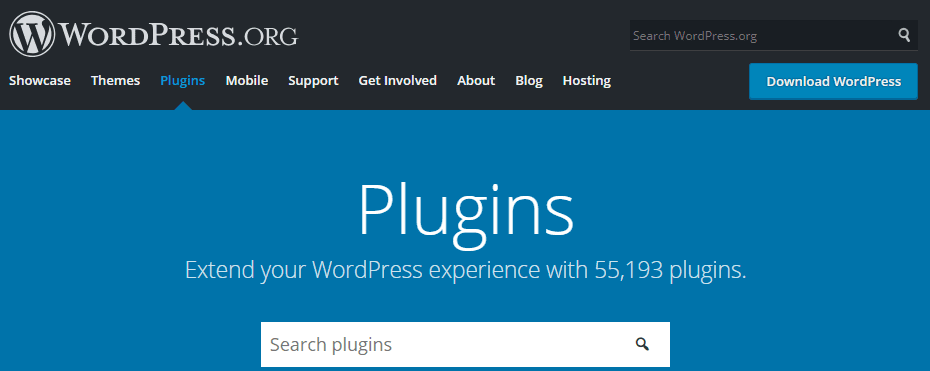There are thousands of plugins and themes you can choose from when using WordPress. However, not all of them are free, and some of the top premium options can be quite expensive.
Unfortunately, cost is one of the main reasons people resort to WordPress piracy, and software as a whole. However, pirating WordPress themes and plugins can come back to bite you in several ways. In this article, we’re going to take a closer look at how WordPress piracy works, and talk about why you should avoid using pirated themes and plugins (even if you’re on a budget).
Let’s jump right in!
A Look Into the World of Pirated WordPress Themes and Plugins
There are a lot of websites that promote pirated WordPress themes and plugins – usually, they don’t even try to hide it. The platform is so popular there’s a lot of demand for piracy, and there are always people who will capitalize on it.
If you’re a savvy user, recognizing these sites is fairly straightforward. They usually have clear web design issues, and they tend to steal theme and plugin descriptions from other sites. You’ll probably also see a lot of bold Download buttons and links to free shared hosting sites:

You’ll find the same type of sites popping up to distribute pirated movies, TV shows, and software. Each time one gets shut down, another one appears in its place.
As long as there’s demand for piracy, people will continue to distribute ‘cracked’ software because they can benefit from it. For example, a lot of sketchy file hosts will pay uploaders for each person who downloads a file or fills out surveys to get access to them. These types of websites can also make money from ads or worse yet, by distributing malware.
Avoiding pirated WordPress themes and plugins is simple – stick to reputable repositories, such as WordPress.org and ThemeForest. The most popular WordPress themes and plugins also tend to have their own websites, as is the case with Divi and all of our other products. All of those sites – including ours – ensure uploaded files are safe to use and won’t affect your WordPress website in any way.
To be clear, avoiding WordPress piracy isn’t just about protecting developer’s bottom lines. It’s also about securing your website, since pirated software comes with a lot of downsides in this regard.
3 Reasons You Should Avoid Pirated WordPress Themes and Plugins
If you’re a savvy web user, you probably already know why you should avoid pirated software in general. However, you might not be aware how WordPress piracy affects your website. Let’s start by talking about malware.
1. They Can Be Infected With Malware
There are a lot of ways malware can affect your WordPress website. It can, for example, try to infect your visitors, replace content on your pages, and even redirect users to other sites. In worst case scenarios, malware can even lead to search engine warnings telling users not to visit your website. Those types of warnings, as you can imagine, can have a profound impact on your organic traffic, and they can last for up to 30 days.
Pirated WordPress themes and plugins are the perfect delivery method for malware infections. Attackers can hide malicious code throughout the files, and most people will just go ahead and install them on their websites without a second thought. You might save money in the short-term by not paying for a premium license, but the potential negative effects to your site are not worth the exchange.
You could get lucky. However, it’s a significant risk to take in the first place. WordPress.org alone contains thousands of free themes and plugins you can use that are squeaky clean:

It almost doesn’t matter what functionality you’re looking for – we’re willing to bet there’s a free plugin that can help you add it to your website. Sure, there’s probably a premium option with more extensive functionality and features. However, you can always upgrade down the road instead of exposing your website to malware. This way, you ensure your site remains safe, and you get the chance to support your favorite WordPress projects.
2. You Won’t Have Access to Support
A lot of popular WordPress themes and plugins provide you with access to dedicated support teams, especially premium solutions. For example, Elegant Themes has its own support forum where you can ask the team for help if you become stuck:

Most serious WordPress developers also provide you with access to extensive documentation, tutorials, and even direct support should you need it. Needless to say, all of this is possible thanks to theme and plugin sales.
When it comes to you – the end user – this level of support can be essential. If you run a large website where the functionality hinges on a particular theme or plugin, having access to dedicated support is essential. Think about it this way – you probably already pay a monthly fee for hosting. You could host your website on a homespun server if you wanted to, but it’s clear the hassle outweighs the money you might save by doing so.
If you pirate WordPress themes and plugins, the same logic applies. You might save money today, but you’ll be stuck trying to solve any issues that pop up on your own. Paying for a license might be a hit to your wallet, but it’s part of the cost of doing business seriously.
3. You Won’t Be Able to Update Your Plugin or Theme
Some premium WordPress plugins and themes require you to register them before you can access updates. This ensures only paying customers can get access to continued support and improvements to the software.
Divi, for example, requires you to authenticate your Elegant Themes subscription if you want to get access to updates. The process is simple, but if you’re using pirated WordPress software, you’ll probably be locked out of most updates.
It can seem like a minor hassle, but outdated plugins and themes are the biggest culprits when it comes to WordPress vulnerabilities. If you’re not updating your site’s elements because some of them are pirated, you’re exposing yourself doubly. First, by using software that might include malware, and secondly, by not using the latest versions.
Sure, you could always return to the site where you downloaded the plugin or theme in the first place, and look for updates there. However, the more files you download from pirate websites, the more chances you run of your site getting infected. When it comes to WordPress, pirating themes and plugins actually involves more work than just paying for licenses.
Conclusion
It can be tempting to pirate WordPress themes and plugins instead of paying full price. However, saving a few dollars can end up causing more damage to your website over the long term. If there’s a particular theme or plugin you can’t afford now, you can always use free alternatives in the meantime, or wait for a discount (usually around a holiday period).
Just to drive the point home, here are some ways pirated themes and plugins can affect your website:
- They can be infected with malware.
- You won’t have access to premium support should you need it.
- You won’t be able to update your plugins or themes.
What do you think about WordPress piracy in general? Share your thoughts with us in the comments section below!
Article image thumbnail by Art Alex / shutterstock.com









hi
you are right
but in some countries like mine “iran” you cant even access those websites(e.g themeforest) without proxy or vpn, and we have to find pirate themes and plugins
i’d like to buy plugins(price of a simple theme will be 400,000 with Rial) but i have to write one each time i need a feature……
Hey! I appreciate not banning my comments! Divi has already done a great job by having the lifetime package, which I am a subscriber under my company name. However, there are shameless developers that accuse people with pirating while forgetting that all they have built is built on top of systems that developers work on them night and day without commercialization. If anyone expect that their theme is closed source they should build for MS frontpage instead of WordPress. What is based on GPL stays as fully GPL. Otherwise, get out of WordPress community. GPL developers are making money not as right, but as a privilege when it comes to support, you have every right to charge for it. We as WordPress community have been already awarding developers by purchasing the software that we do not have to purchase. The ones that don’t purchase are just the ones that do not want to award. I am sure the awarding people are more than not awarding. But even if not, still you should be thankful to people using them for free. They are thankful to you too but they don’t have to show it by making payments.
Common! Yes support the developers if you like their plugins and themes. However, keep in mind that none of these developers can close their sources. They are GPL because they are built on GPL. Period. If WordPress and all other stuff including the programming languages and even the Linux was closed source, you would never be able to have such a community and be making money. Don’t mislead people. Who you think you are compared to WordPress and Linux developers. You think you are smart and those developers are stupid? You are nothing without them.
I’ll be honest–I used a nulled version of Divi a few months ago. This is only because I wanted to try it out and make sure it was right for my needs. I’ve been burnt by purchasing several themes from other devs and finding that support was lacking, features were missing, bugs breaking the site.. But after trying Divi on a new build, I absolutely loved it and how much easier it was to use than all other themes I’ve tried so I signed up for a membership. If there was a way for me to try it free for a few days, I would have never used a nulled version though.
Divi is awesomeness personified, and the annual fee a pittance. If something enhances a person’s experience as a developer and enhances the experience of the end-user why wouldn’t a person pay for that? Really for me, there are two reasons not to use anything pirated:
It’s unethical
It’s Dishonest
Theft of intellectual property is still just theft. I figure if a body is using private plugs, themes, desktop software or whatever, they get what they deserve when the hacker’s come calling.
I love Divi.
Guys if you really love Divi. Get licensed and support developers.
Ok, so the ET blog has always been one of my favs, but this article I find highly annoying and misleading.
I can only assume you are referring to sites like GPL clubs. The thing is, these sites are not PIRATING anything. WordPress themes and plugins, including the majority of premium themes and plugins are released under the GPL. And guess what that means? It means it is perfectly legal and within the ethics of the GPL to redistribute these products, even for profit.
Yes it is absolutely true that you should be careful and check out the sites you obtain these from. In my experience, most GPL clubs are ethical and do not infect the products they redistribute. That said, there are bad actors in every arena.
True, you will not get support/ But then, maybe you do not need it. If you do, you can buy a license later.
Finally, you claim you will not be able to update your themes and plugins. You will not be able to get automattic updates, but you can still manually update.
I recently gave a talk at WordCamp St Louis about the GPL & Ethics, in which I discussed GPL clubs. You can see the slides from that presentation here: https://docs.google.com/presentation/d/10BiKMofT_wzWU4DNQ1mVUpHmBnfnnnxS5sGQcicQziU/edit?usp=sharing
This article is another example of peoples lack of understanding of the GPL. Redistributing original, unmodified GPL products is not PIRACY. Period.
Above all selling or using pirated themes, plug ins or software is immoral, unethical and illegal.
Wrong. See my comment below.
I used to use nulled plugins from one of those sketchy websites to fill gaps in functionality because I couldn’t afford to upgrade to the premium version of a plugin. I don’t remember what this specific plugin was, but the first few tries, I couldn’t activate it because the files were corrupted. The third time, with a different copy from the same sketchy website, I actually was able to activate it.
But thanks to malware, that was the last time I saw that website. The database was wiped clean and I had no backups. I had to rebuild the entire website from scratch.
Pirating plugins doesn’t only hurt the developer. That was the last time I tried to pirate a plugin.
No serious designer or website owner should ever consider using pirated software or copyright material. Be proud, be professional and be honest.
GPL work is not copyrighted because the GPL is NOT a copyright license. It is a COPYLEFT (AKA Opensource) license.
MY #4 is – harming the community by downloading free or so called free software of any kind results in vendors being unable to provide the right level of support through financial harm being caused to them and their employees. Just.Don’t.Do.It. –
I dont know how manny people use nulled theme and plugin.
Of the three, only problem one is the real reason why I don’t pirate. 99% of the time I’ve never used support. Updates are good but I’ve never noticed them bugs.
The 1% I’ve used it though it was something done by the plug-in itself and not by the site. Support had to do a fix or else my plug-in wouldn’t have been marked as licensed. All else worked. Kudos for Envira though!
WordPress has always had a strange relationship with the requirements of the GPL. While the licensing isn’t as clear cut with themes, all WordPress plugins are derivative works and must be licensed as GPL-2.0 or GPL-3.0. It is not piracy to remove or add code from a WordPress plugins and redistribute it. While distributing malware is unethical, removing code that attempts to limits someone’s rights under the GPL is not. Developers SHOULD charge for their time/support, but too many wp plugins try to impose what amounts to commercial licenses on open source software. I’m actually surprised it has taken this long for the ‘pirated’ versions to impact WP plugin/theme revenue to the point you feel compelled to write about it.
We’ve found that “piracy” or what is likely more accurately just the lazy business practice of snagging someone else’s work and selling it yourself, doesn’t actually hurt our sales. However, that doesn’t remove the risk the end user takes on when using these themes/plugins, as outlined in the post.
Which is why it on the user to research their sources. I am not ashamed to admit that I use GPL clubs. But I researched each club before I subscribed. And even then, I inspected every product I downloaded until I had become confident the source was reliable.
4-you are a a..hole exploiting the hard work from somebody else.
This must be the core issue! Stealing someone or even a team hard work isn’t a good thing. Put yourself in the developer shoes, can you allow that?
It may surprise you, but most of the theme and plugin developers I have spoken to, actually are not bothered by things like GPL clubs. In fact, some even encourage them. They understand that these sites amount to free marketing. Think about it: A site owner downloads your theme from a reputable GPL club. Later, they have an issue that requires support. Or they tire of having to manually update. What do they do? They buy a license from you.You now have a new customer who may have never even found your theme if not for the GPL club that made it affordable.
Paying for software supports the plugin author so they can continue to debug and improve their software, which gives the end user the added benefit of continuity. Finding replacement software down the road comes with its own challenges and disadvantages.
Don’t get me wrong I use lot’s of free plugins, but if I’m implementing a plugin on multiple sites and there’s a premium available I gladly pay. Creating and keeping on top of software takes a lot of time and effort and people should be compensated.
More often than not, new clients with existing sites and issues they need help fixing, comes down to pirated Themes and Plugins, it’s always the first culprit and usually the solve is to explain to the client that their previous developer hooked them up with “free” malware. It’s annoying to be sure and one of the reasons I rarely use any plugins that is not from ET or WPMU DEV and of course Divi! It’s just not worth all the hassle when I already have awesome tools and the support to make Anything happen with those tools.
Matthew
I have been doin this for 13 years. I have NEVER had a customer whose site was broken due to “pirated” software.
There are reputable sites that use the GPL license that legally allows copying and they update the plugins. If you don’t need support, its a good money saving option. Never had malware problem. They’d be out of biz if that happened.
Omar, actually these “GPL” sites are not even close to being legal. The GPL license permits the distribution of source code, and those sites distribute a lot more than just the source code. At the very least, they are guilty of copyright and trademark infringement.
If they took the source code from popular plugins/themes and made some changes including changing the name completely, removing all the images, text copy, etc THEN it would be legal. But they don’t. They include all the companies branding including the plugin name, images, copy, etc so that others can easily identify it as the plugin/theme that they are unwilling to pay for.
GPL does not require modification for redistribution (https://www.gnu.org/licenses/gpl-faq.en.html#StolenCopy).
According to a response from the Software Freedom Law Center (https://wordpress.org/news/2009/07/themes-are-gpl-too/) – CSS and JS are GPL too.
Unless a plugin/theme name is trademarked, it is not protected by copyright when distributed under GPL – which it is if it is meant for WordPress.
A lot of theme authors are wise to copyright issues in their own right to distribute copies of images, and typically either use royalty free, and/or alter the image significantly enough to void any copyright issues. Again, this assumes the demo content is bundled and used with the theme.
I don’t make these statements in support of “pirated” plugins/themes, but rather because I firmly believe the use of the word “pirated” to describe distribution under GPL is false and not applicable. It is also not illegal to redistribute under GPL.
Full disclosure, unless I make a custom theme, I purchase a license from Theme Forest, and I don’t redistribute anything I purchase.
The author of this article needs to go sit down and have a chat with Matt Mullenweg, you know, the founder of WordPress and maybe Matt can explain the GPL license to him and how it is NOT the same as software piracy.
Same goes for the poster above who seems intent to go off on a tangent about source code, copyright and trademarks. Even Elegant Themes own terms of service states that the CSS and images are GPL licensed. The only thing that is not are the .psd files and they’re packaged separately for that reason.
Jeez … it’s astonishing how many people build a business off open source software and then can’t grasp the fact that this means that when you sell your derivative work it must also be open source.
As wordpress.org put it in their submissions document:
“If you wish to submit your creation to the free theme repository on WordPress.org, it must be 100% GPL compliant, including CSS and image files. Because the freedoms spelled out in the GPL are at the heart of WordPress, we encourage developers to distribute their themes with a 100% GPL-compatible license.”
No mention of software piracy. Unless of course piracy is ‘at the heart of WordPress.’
The two are not the same and I’m surprised at Elegant Themes for allowing such a post on their site given their previous support for the GPL license. Are they just hoping for a bit of clickbait traffic or are they now suggesting that GPL = software piracy?
Ken, I 100% agree. You release under the GPL, you agree to to allow folks to redistribute. The GPL is based on 4 freedoms, two of which specifically address this:
“The freedom to redistribute copies so you can help your neighbor.
The freedom to distribute copies of your modified versions to others. By doing this you can give the whole community a chance to benefit from your changes. Access to the source code is a precondition for this.”
Thank You, me too. And now I gave malcare subscription where it backs up and clean if there is any problem.
Many people are suckers for free, but most of the time it always comes at a price. Much more expensive than actually paying for what we’re looking for.
Agreed.
I recommend everyone to keep out from pirated themes. There´s a reason for everything and pirated themes often contains malware, that´s why it´s free to download. So never download pirated themes.
But I think that many theme developers should try to make it possible to download and try Premium themes for a short period, let´s say 7 days before buying. It´s hard to find out if a theme is right just by looking at screenshots. Some try before you buy should be possible.
Or perhaps a better model would be to release your premium products free and charge for support & updates.
There are some independent platforms that allow ‘Try WordPress products before you buy’ solution. You can find one such free service at: demo.diywithwp.com
This is regarded by many as one of the best facilities to learn how to use WordPress and various products built around it. The integrated video tutorials in wp dashboard allow users to get hands on WordPress training inside their own test site.
Hope you find this information useful.
I agree. Too many theme and plugin developers make it actually quite difficult to assess their products. If you are going to invest a whole lot of money in expensive plugins you want to know that they are compatible, will be updated consistently past purchase, and they are doing what you actually want them to do. The number of times you read the product description only to find that it doesn’t 100% do what it says or rather you misunderstood what it actually says is not insignificant. WordPress should insist on money back terms, 30-day trials, online demos, comprehensive documentation, comprehensive screenshots to be allowed on the depository. Also, they should insist on a support free tiered pricing option rather than developer club pricing. How many plugin clubs do you have to join! If you offer people the options they want, they will pay. I think most people want to pay but if they don’t need support why should thay have top pay for it. Pay for updates sure.